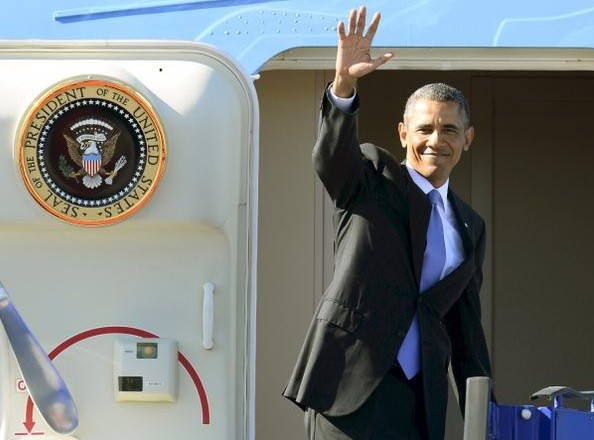Obama Admits He Faces 'Heavy Lift' over Congress Vote on Syria

US President Barack Obama has returned to the US following the G20 summit in St Petersburg, acknowledging that he faced a "heavy lift" in securing Congress's backing for air strikes against Syria.
Obama made little headway in winning support from leaders of the world's most powerful economies, with sharp divisions remaining over Syria as the meeting broke up on Friday.
"Any action we take would be limited, both in time and scope - designed to deter the Syrian government from gassing its own people again and degrade its ability to do so," Obama said in his weekly radio and internet address.
"I know that the American people are weary after a decade of war, even as the war in Iraq has ended, and the war in Afghanistan is winding down. That's why we're not putting our troops in the middle of somebody else's war.
"We are the United States of America. We cannot turn a blind eye to images like the ones we've seen out of Syria."
Russian President Vladimir Putin had warned that Russia would "help Syria" in the event of US intervention, but stopped short of providing details.
Putin said Canada, Turkey, France and Saudi Arabia had supported Obama's call for military action, but that China, India, Indonesia, Argentina, Brazil, South Africa and Italy had all come out against it.
Putin added that the British Prime Minister David Cameron had supported Obama's position despite having been overruled by his own parliament. However, the majority of G20 nations opposed action, according to Putin.
French President Francois Hollande said his country would wait for UN inspectors to submit their findings on the alleged chemical weapons attack, but reiterated his country's support for military action.
Obama at one point appeared to leave open the possibility of a climb-down should Congress reject his authorisation request.
"I'm not itching for military action, and if there are good ideas that are worth pursuing, then I'm going to be open to them," he said.
Obama said he would now clear his diary to allow for intensive efforts aimed at persuading Congress of his case ahead of Monday's debate.
More than a third of Congress members remain undecided over military action, according to a poll for the BBC and ABC News. Of those who had decided, a majority said they would vote against the president.
'Paralysis'
Obama said "paralysis" at the UN Security Council meant he needed to act outside that organisation's ambit.
Obama and Putin held 20 minutes of intense talks on the sidelines of the summit, but faIled to close the gap between them, Putin said.
"It was a very friendly conversation. We stick to our guns. Everybody remained with his position," Putin said.
"We understand each other... We listen to each other. We understand arguments, we do not agree with those arguments.
"Will we help Syria? Yes we will. And we're doing it right now. We're supplying arms. We are co-operating in the area of economy."
Obama termed his talks with Putin "candid".
"Everybody's always trying to look for body language and all that, but the truth of the matter is that my interactions with him tend to be very straightforward," he said.
"I said, listen, I don't expect us to agree on this issue of chemical weapons use, although it is possible that after the UN inspector's report, it may be more difficult for Mr Putin to maintain his current position about the evidence," Obama said.
The US president conceded military action would be "unpopular", but said he would spend the coming days making his case to his nation.
He declined to comment on what action he would take should Congress reject his call.
He said that while there was a "unanimous" view among G20 leaders that chemical weapons had been used in the Syrian conflict, there were divisions on how to respond.
Several countries said they would support any action as long as it was agreed by the Security Council, said Obama.
EU defence ministers meeting in the Lithuanian capital Vilnius agreed the Syrian government was responsible for a chemical weapons attack on the eastern suburb of Ghouta on 21 August, in which the US believes 1,429 people died. Britain puts the number of fatalities at 355.
Putin has dismissed US evidence that Assad's regime was responsible for the attacks, blaming rebel forces for carrying out the attack to provoke US intervention.
Opposition to military action has grown. UN Secretary-General Ban Ki-moon that there was no military solution to the Syrian conflict.
The UN and Arab League envoy Lakhdar Brahimi said any action would require UN Security Council approval.
US Secretary of State John Kerry will now embark on a four-day trip to Europe aimed at gaining support for US-led intervention.
Kerry will hold talks with EU foreign ministers in Vilnius on Saturday before going on to meet Arab League representatives in Paris. He will then travel to London for talks with Britain's Foreign Secretary William Hague.
As tensions in the region mount, the US warned its citizens against travel to Lebanon. It also said it was evacuating "non-emergency personnel" from its embassy in Beirut and its consulate in Adana, southeastern Turkey.
More than 100,000 people have been killed since the outbreak of Syria's civil war in 2011. A third of the country's pre-war population of 20.8 million have fled their homes, according to the UN's refugee agency.
© Copyright IBTimes 2025. All rights reserved.





















